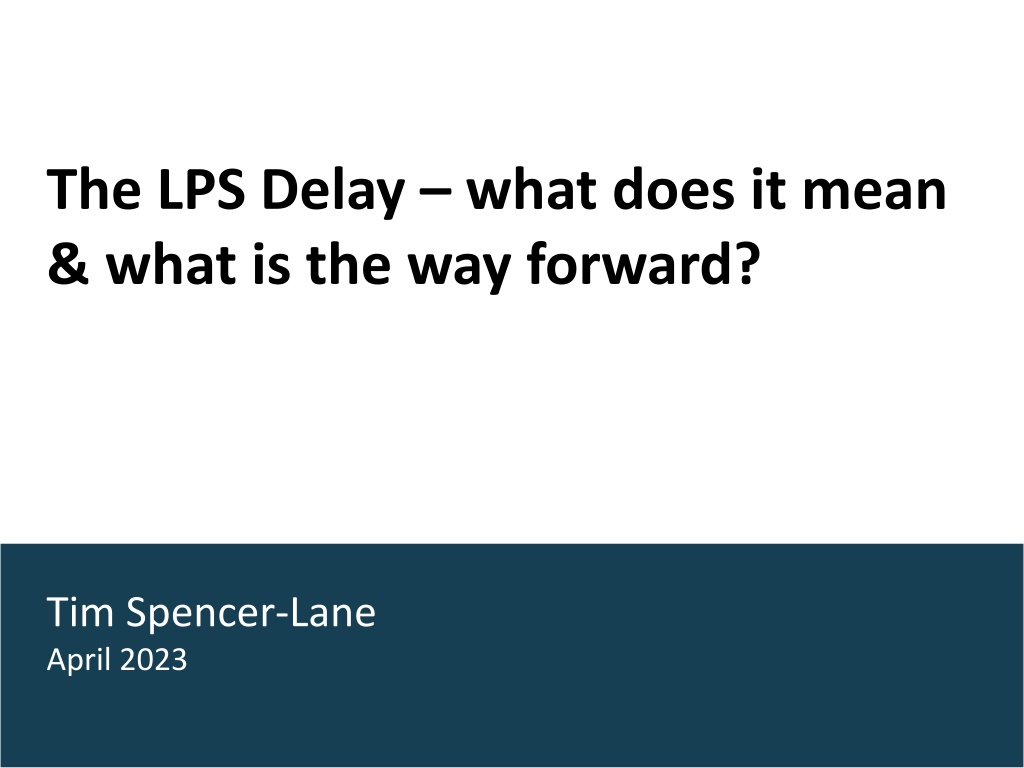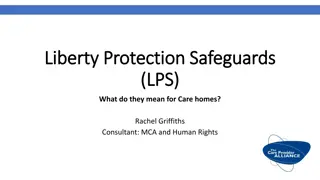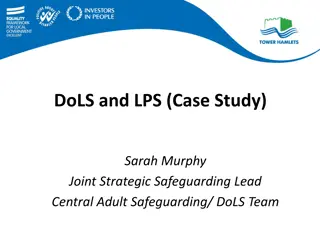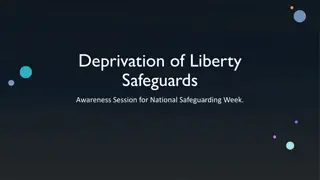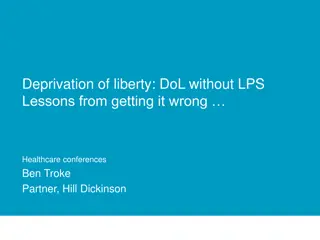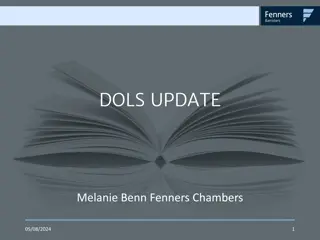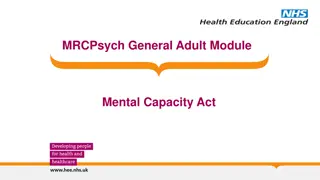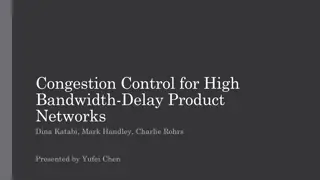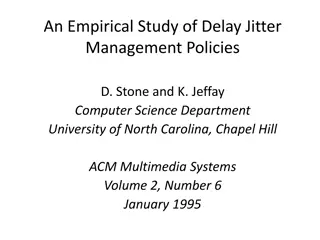Uncertainty Surrounding the Delay of the Liberty Protection Safeguards (LPS) Implementation
The delay in implementing the LPS beyond the current parliamentary term has raised questions about its future under different governments. The redeployment of the LPS policy team signifies a significant setback. Moving forward, the DHSC plans to release a summary of consultation responses but the draft Code of Practice and the Welsh government's disappointment emphasize the need to strengthen the existing Deprivation of Liberty Safeguards (DoLS) system.
- LPS delay
- Government decision
- Policy implications
- Liberty protection
- Deprivation of Liberty Safeguards
Download Presentation

Please find below an Image/Link to download the presentation.
The content on the website is provided AS IS for your information and personal use only. It may not be sold, licensed, or shared on other websites without obtaining consent from the author. Download presentation by click this link. If you encounter any issues during the download, it is possible that the publisher has removed the file from their server.
E N D
Presentation Transcript
The LPS Delay what does it mean & what is the way forward? Tim Spencer-Lane April 2023
Adverse possession The LPS delay April 2023, DHSC confirmed that LPS will be delayed beyond the life of this Parliament (which lasts until Dec 24 at the latest) This decision is said to be the result of its prioritisation work on social care The announcement says: We recognise that this delay will be disappointing news for many of the people and organisations who have worked closely with us on the development of the LPS since the Mental Capacity (Amendment) Act was introduced in 2019. This decision has not been taken lightly. Consequently, civil servants from the LPS team at DHSC are moving on to other areas
But what does this really mean? There is no date for implementation (unlike the cap on care costs) Any decision to implement the LPS is a matter for a future government Will LPS ever be implemented? Would a new labour or coalition government want to introduce LPS (or see it as a priority)? Would a new conservative government see this as a priority? It is very significant that the LPS policy team has been redeployed
LPS is off the agenda for the foreseeable future
So going forward DHSC announcement says it plans to publish a summary of consultation responses What about the draft Code of Practice? Welsh government said it was deeply disappointed with this decision the right to liberty is one of our most fundamental rights https://www.gov.wales/written-statement-update- implementation-liberty-protection-safeguards Need to refocus on how to strengthen the current DoLS system
A re-introduction to the DoLS DoLS apply only to adults in hospitals and care homes Hospital or care home ( managing authority ) must apply to the local authority ( supervisory body ) for a standard authorisation Request must be made if it is likely the person will be detained in next 28 days The supervisory body must arrange 6 assessments If all 6 assessments are positive , the supervisory body must grant a standard authorisation The authorisation can be granted subject to certain conditions If deprivation of liberty is already occurring (or imminent) the managing authority can grant an urgent authorisation for 7 days (extendable once)
DoLS qualifying requirements 1) Age is the person 18 or over? 2) Mental health is the person suffering from a mental disorder? 3) Mental capacity does the person lack the material decision- making capacity? 4) Best interests is being a detained resident in the person s best interests, & necessary/proportionate to prevent harm to them? 5) Eligibility is the person excluded by Sch.1A (eg they are detained or objecting to admission under Mental Health Act)? 6) No refusals would the authorisation conflict with an advance decision or decision of a deputy or attorney?
The safeguards A relevant person s representative (RPR) must be appointed to keep in touch with, & represent and support the person An IMCA must be instructed, eg if the person or the RPR is unable to exercise their rights Supervisory body may review the authorisation at any time, & must on request or if qualifying requirements are reviewable The person or RPR can apply to the Court of Protection as of right (non-means tested legal aid available) In England, CQC must monitor & report on the operation of DoLS (in Wales CIW & HIW)
DoLS Annual Statistics 2021-22 NHS Digital(11 Aug 22) No. of applications was 270,650 (increase of 5.5%), 56% with an urgent application The average growth rate per year is slowing 2014-20 it was 14% each year, whereas 2016-22 it was 4.5% No. of completed applications was 254,215 (this has increased over the last five years by an average of 11% each year) Cases at year end was 124,145 (increase of 4%) Proportion of applications completed within the statutory timeframe of 21 days was 20% (fall from 24%) Average length of time for all completed applications was 153 days, compared to 148 days in the previous year
Have DoLS referrals been held back due to the expectation that LPS is on its way?
Unlawful deprivation of liberty & the courts LB Haringey v Emile [2020] MHLO (CC): damages of 143,000 awarded after failure to authorise deprivation of liberty in a care home for 8 years (not a technical breach of Article 5 because there were options other than residential care) Essex CC v RF [2015] EWCOP 1: judge approved an award of 60,000 plus costs of between 50,000 and 64,000 and repayment of 23,000 in care home fees where the local authority s conduct - depriving P of his liberty in a care home for 13 months - had been reprehensible . Burden of proof on detaining (and/or authorising) body to show no harm caused
Unlawful deprivation of liberty & the ombudsman Cheshire East Council (19 010 786) Council at fault for having no triaging system & taking 11 months to issue the DoLS authorisation for a man in a care home But did not cause injustice as person cared for in his best interests Also noted current backlog was 1,132 (low or medium priority) & ordered to produce action plan to address potential justice Staffordshire CC (18 004 809) Council at fault after deciding not to carry out DoLS assessments of low & medium priority (backlog 2,927) Resource considerations not a legitimate reason for failing to carry out assessments
Key issues for DoLS Clearing backlogs v screening tools Do you have a robust justification for your screening criteria? Are individual lower priority cases being reviewed? What about waiting lists for community DoL & young people?
Adverse possession LPS transferrable principles Deprivation of liberty is everyone s business DoLS should be streamlined with other assessment, review & planning processes Deprivation of liberty should come after, not before, the authorisation is granted
Refocus community DoL Applications to Court of Protection required for those deprived of liberty outside of hospitals & care homes Includes those in supported living, shared lives and domestic & family settings Remember ICBs are responsible for CHC cases Court distinguishes between contentious & non- contentious cases The ReX process applies to non-contentious cases (dealt with on the papers) Approx 4,000 applications a year out of an estimated 59,000 cases (inc 16/17-year-olds) Non-means tested legal aid is not available
Dont forget section 4B MCA The unamended section 4B remains in place Once a court application is made, decision-makers are authorised to deprive the person of liberty Applies when necessary to provide life-sustaining treatment or reasonably believe necessary to prevent serious deterioration in the person s condition NB the amended version of s.4B in the Mental Capacity (Amendment) Act 2019 is not in force
Refocus 16/17-year-olds Applications to Court of Protection (or National DoL Court) required for 16/17-year-olds deprived of liberty Includes those in domestic home, day or residential school or college, children s home, fostering placement, short break or other respite provision, & planned hospital stay Streamlined procedure unlikely to appropriate for 16/17-year- olds (KL (A Minor : deprivation of liberty) [2022] EWCOP 24) If there is reasonable expectation that existing DoL will still be necessary once the young person turns 16, this should be planned for well in advance Given close links between the DoL authorisation & EHC plan, local authorities should consider linking reviews Approx 6,600 cases but relativelyfew court applications Non-means tested legal aid is not available
Refocus Article 8 issues DoLS provides a focus on Article 5 matters (ie the right to liberty) But often Article 8 issues (ie right to private & family life) are of more significance to the person & their family These include decisions about restricting contact with family & friends, what treatment is being provided & deciding where the person should live by viewing the case primarily through the prism of art 5 one risks repeating a central fallacy and conflating the secondary question of whether a person is lawfully deprived of his liberty with the primary question of where he should be living (Hillingdon LBC v Neary [2011] EWHC 1377) The best interests analysis should be followed by an analysis of whether any infringement of Article 5/8 is necessary & proportionate (Westminster CC v Manuela Sykes [2014] EWHC B9)
Refocus best interests assessors a cornerstone of the protection that the DOL safeguards offer to people facing deprivation of liberty if they are to be effective as safeguards at all (Hillingdon LBC v Neary [2011] EWHC 1377) In a relatively short space of time the role of the BIA has developed into a knowledgeable and well-respected quasi profession (Law Commission) Important to retain LPS thinking which focused on the necessary & proportionate aspect of DoL Local authorities (and NHS partners) must ensure there is a sufficient supply of BIAs for its area
The Neary principles Hillingdon LBC v Neary [2011] EWHC 1377 1) The DoLS scheme should not be used by a local authority as a means of getting its own way on the question of whether it is in the person s best interests to be in the place at all 2) Where a local authority wears a number of hats, it should be clear about who is responsible for its direction 3) The responsibilities of a supervisory body require it to scrutinise the assessments with independence & a degree of care appropriate to the seriousness of the decision & the circumstances of the individual
My contact details t.spencer-lane@kingston.ac.uk Thank you for listening
